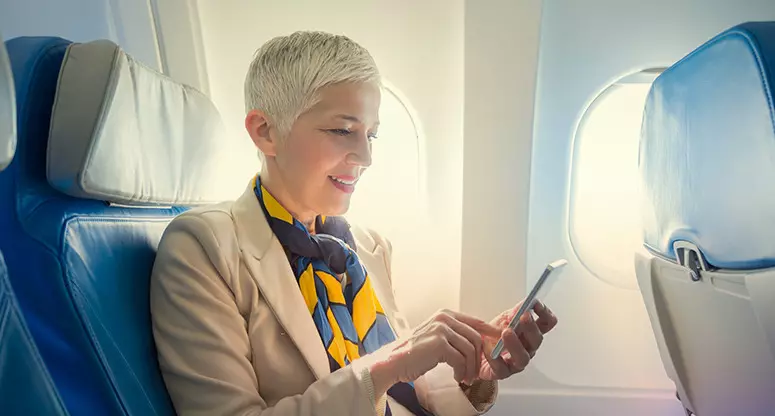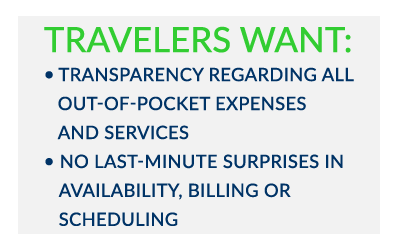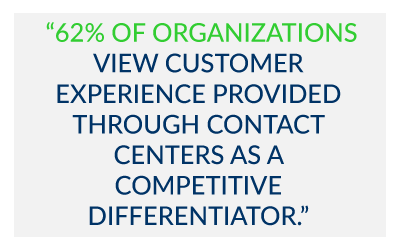
Consumers are Willing to Pay for Better Customer Experience
For travelers, the more responsive the customer service, the better the experience. And that fact plays into a shift in consumer spending, where experience-rich services are now valued more than products.
Service-driven spending, in fact, looks solid in 2017, according to Deloitte. Trends show consumers are more than willing to pay for excellent experiences that live up to their expectations.
For companies in travel and hospitality, here are a few insights from industry experts for elevating customer experiences—and along with them, business performance and brand reputation.
1. Consumers want frictionless service
For a traveler, a hassle-free trip begins long before taking a seat on an airplane or setting foot in a hotel.
One of the points made in a Forbes article on customer trends is that proactive companies are “getting better at spotting problems and fixing them before the customer notices and complains.”
Too often, recurring problems—that could easily be solved—pop up and chip away at the customer experience. Travelers, for example, want transparency regarding all out-of-pocket expenses and services, with no last-minute surprises in availability, billing or scheduling.
So anticipate. Be the traveler, as outlined by hospitalitynet.org—mixing performance and pleasure. As expected.
2. Travel companies must stand out to stand a chance
Today, consumers have unprecedented choices when it comes to lodging. In its 2017 travel and hospitality outlook, Deloitte points out that traditional hoteliers are challenged by the proliferation of online travel aggregators, which offer consumers unlimited hospitality options.
Airbnb (Air-bed-and-breakfast) and VRBO (vacation rentals by owner) are two online hospitality services with unique locations and accommodations at competitive rates. Availability, photos and reviews are all there online, along with easy booking.
To compete, hotels must live up to their industry name in every way: hospitality—before, during and after a stay. It’s more than “the stay.” Rather, it’s how the experience stays with you.
Hilton’s Tru brand, for example, is offering more efficiently designed, smart guest rooms and reimagined lobbies for a variety of activities—along with mobile check-in and fast Wi-Fi. As advertised: “It’s familiar, and it’s also unexpected.”
Sounds like old-school customer service, with the new-age promise of something more.
3. How a customer “feels” affects the financials
Travel and hospitality companies are on notice. By 2018, Gartner reports “more than 50 percent of organizations will implement significant business model changes in their efforts to improve customer experience.”
Stepping up requires better self-service applications, word-of-mouth recommendations and increased in-the-moment satisfaction. Netted out, it means elevating the status quo to stand out.
Nearly 10 years ago, The Harvard Business Review described it as the “economics of service.” Profit and growth come from customer loyalty, as a result of customer satisfaction, which is provided by satisfied and productive employees. That thinking is even more valid today.
As expected, the quality of the customer experience is key to retention, satisfaction, sales and much more. In short, how customers feel affects the financials.
4. Big data enhances customer experience
More companies are taking advantage of big data to personalize the customer experience. With the exponential processing power now available for data analytics, companies can get a more precise understanding of what their customers want, when they want it.
Industry consultant James McCormick of Forrester writes that companies need to cultivate business intelligence to develop “a holistic understanding of customers across digital touchpoints.” With this perception, they can perfect their experiences in the moment.
Travel profiles, which are nothing new, can make better use of new technology to create something closer to real-time insights. This technology could determine what kinds of hotels, flights and rental cars a customer prefers, depending on leisure versus business travel.
Such pinpointed personalization helps ensure a most-welcomed customer outcome.
5. Travel agents aren’t going away anytime soon
Sometimes, an actual human voice, real—not digitized, can better guide travelers to the right answers.
According to Deloitte, “62% of organizations view customer experience provided through contact centers as a competitive differentiator.”
This benefit, of course, requires savvy travel agents. Agents who not only understand the options, but also know the workarounds when prompts and auto-commands fail to deliver.
Call centers come in many flavors. One alternative that’s grown in importance with U.S. travel companies over the last several years is the home-based agent model. Today, the trend is still going strong.
The home-based or distributed workforce model brings companies from different industries many benefits, such as:
- On-demand talent, not restricted by a single geographic location.
- Capability to scale up or down as service volumes fluctuate.
- The exact skills needed for the job—from bookings to white-glove service.
- Elimination of major costs: overtime, capital equipment and office space.
- Empathetic agents who identify with customers, increasing satisfaction and business.
-
Related Posts
-
10 Essential Steps to Scaling Retail Customer Service…
06/18/2024 Gail Rigler -
10 Influential Women Leading Customer Experience (CX) in…
03/28/2024 Gail Rigler -
The Trust Factor: Why Live Agents Still Matter…
10/06/2023 Gail Rigler
-
-
Recent Posts
-
The Hidden Equation: Why Retention + Onshore CX…
09/23/2025 Gary Ash -
Ensuring Compliance in Healthcare Contact Centers: Protecting Patient…
09/17/2025 Edgar Hernandez -
The Future of Healthcare Communication: How Contact Center…
09/17/2025 Edgar Hernandez
-
-
Ws News
-
Working Solutions Named Customer Contact Week’s BPO of…
06/11/2025 Springfield Lewis -
Working Solutions Deepens Its Commitment to Exponential Growth
05/29/2025 Springfield Lewis -
Working Solutions, An Advocate for Great CX, Places…
05/20/2025 Ronnie Myers
-







